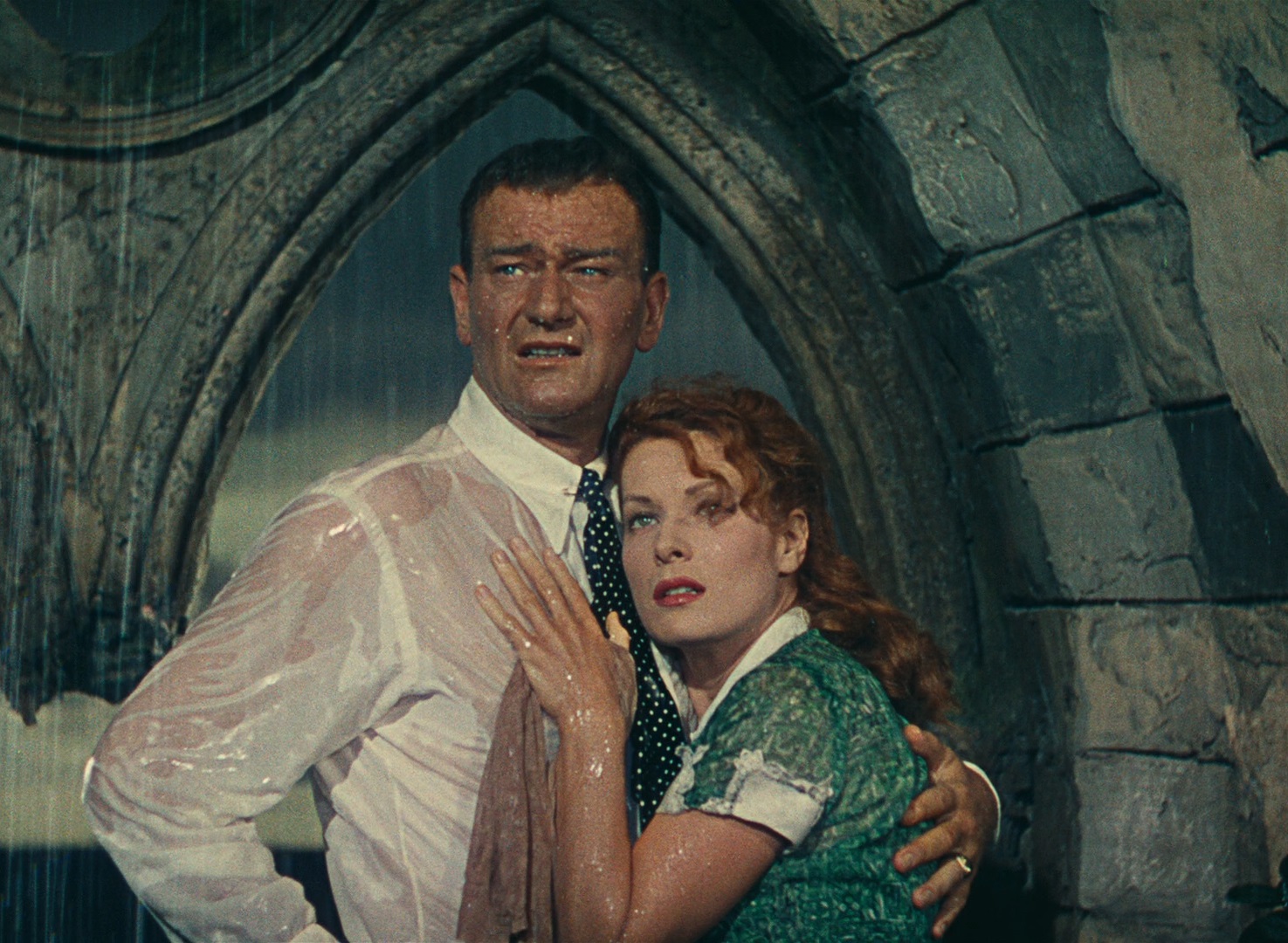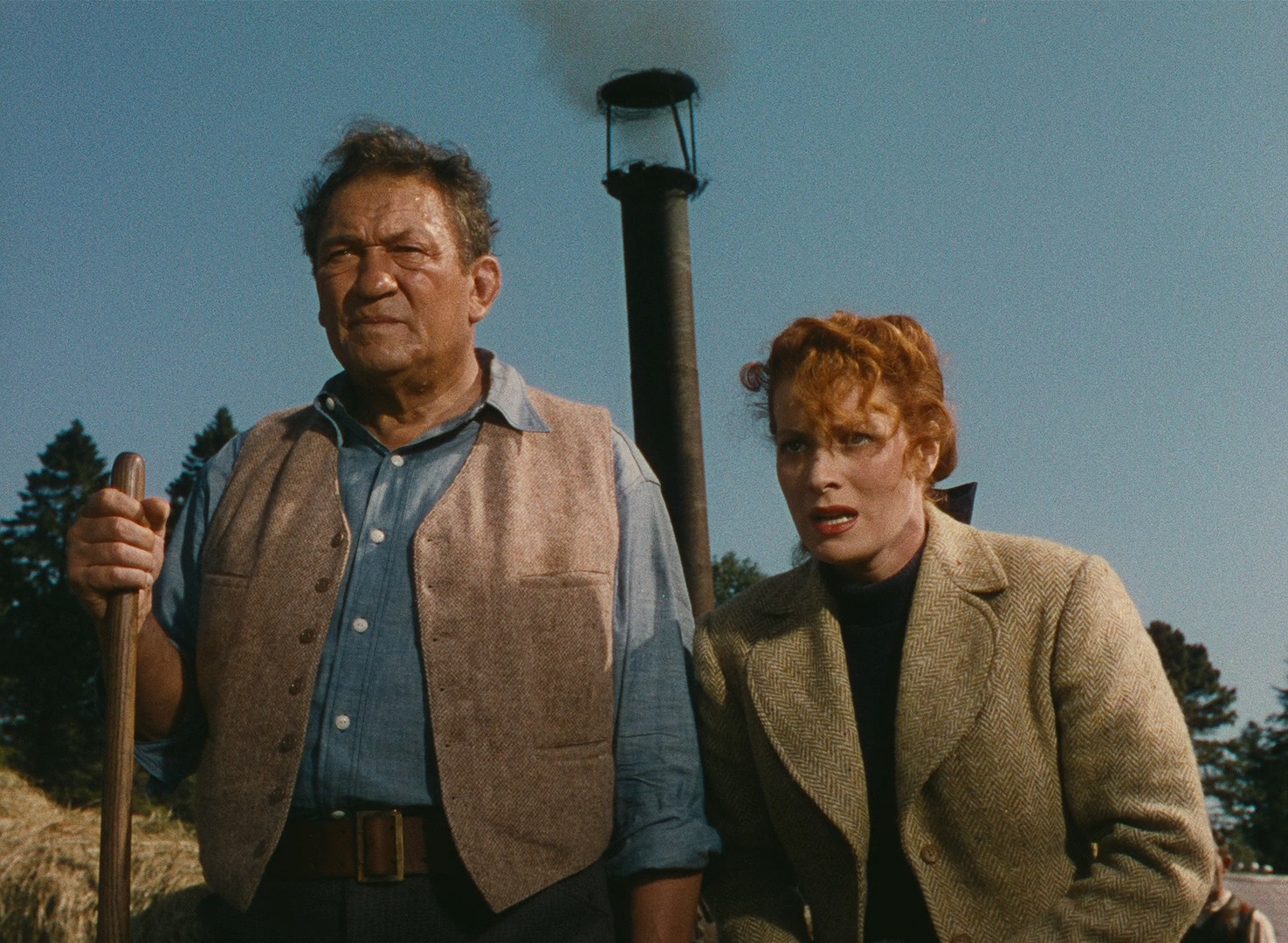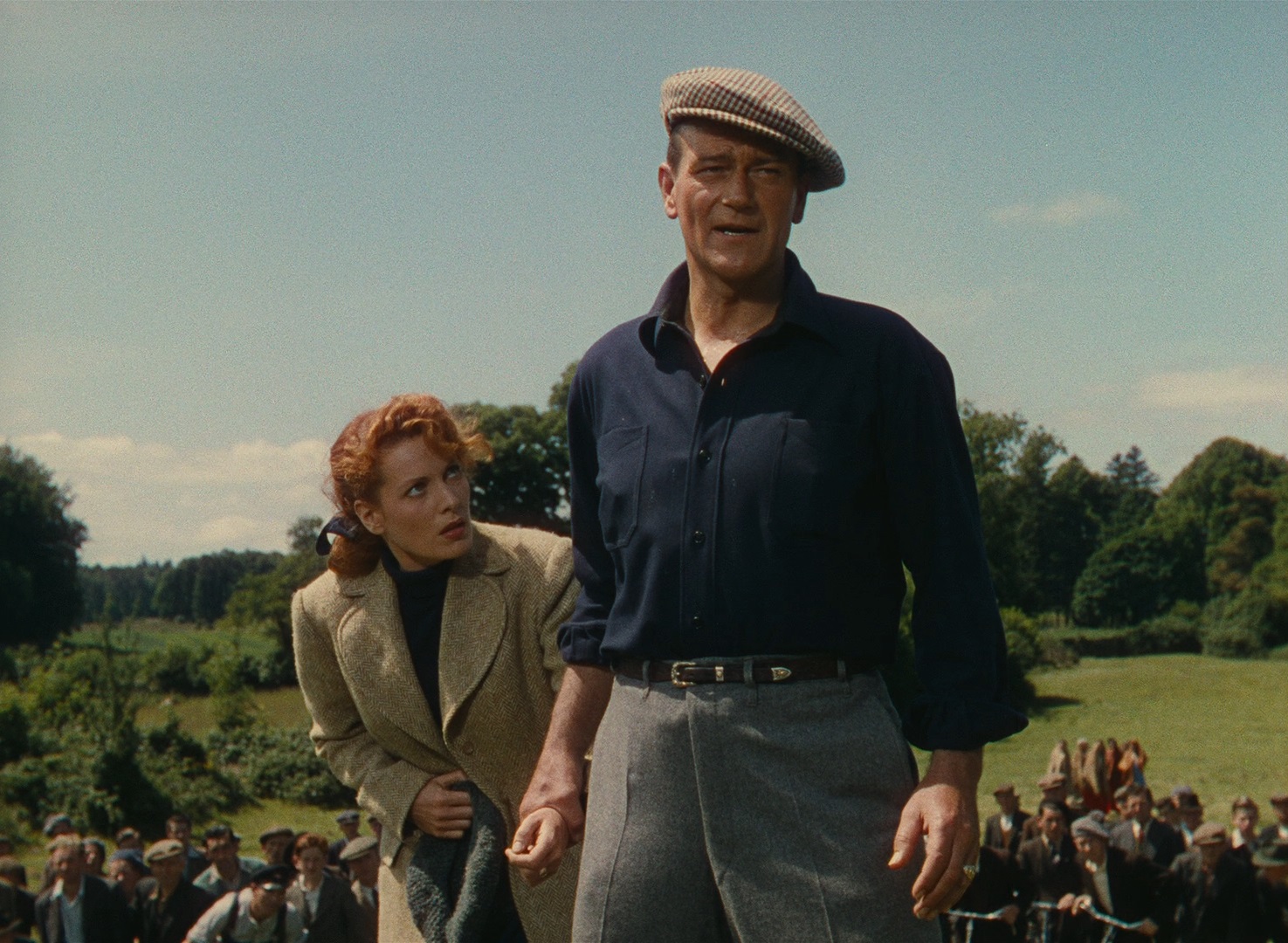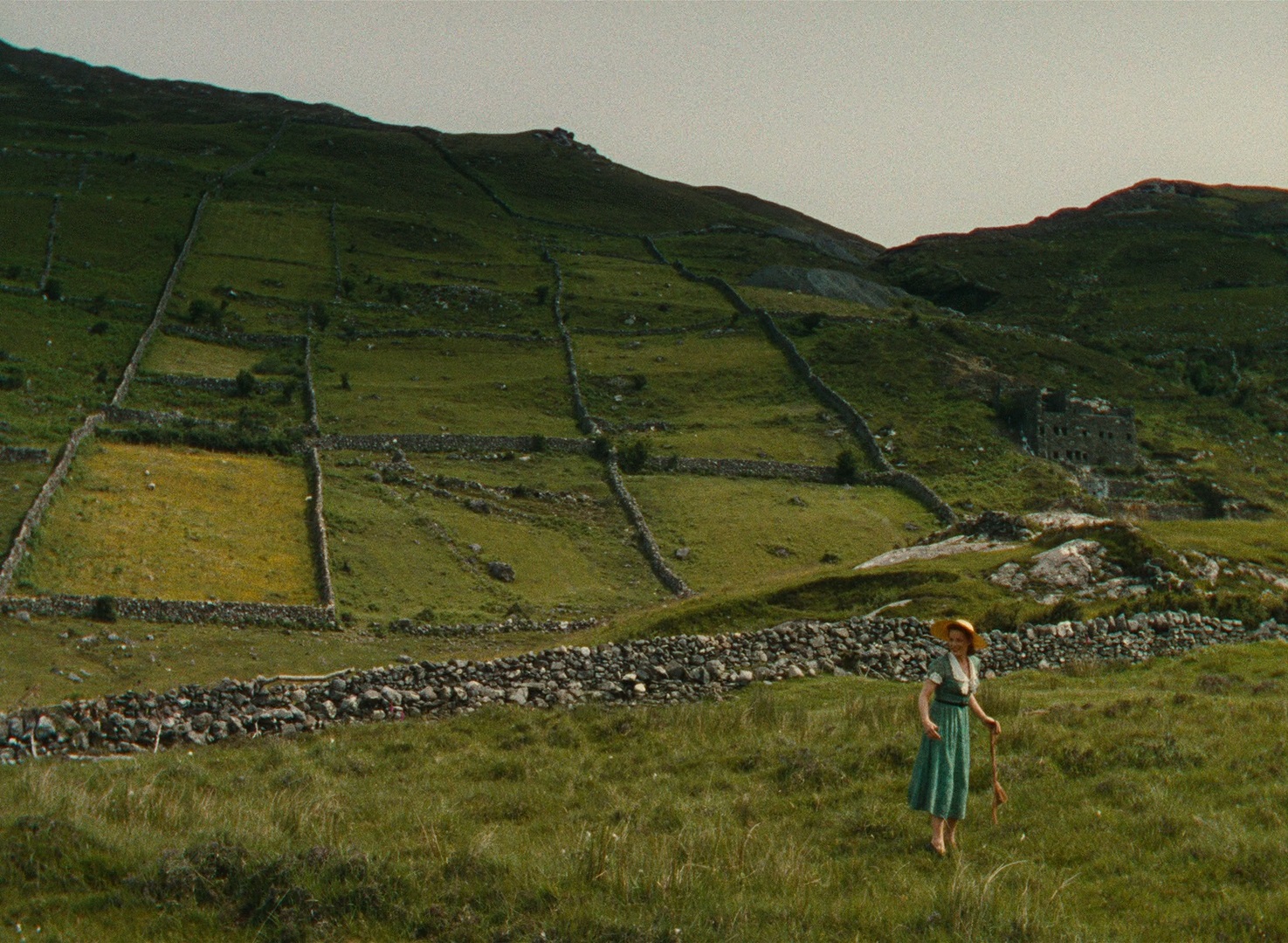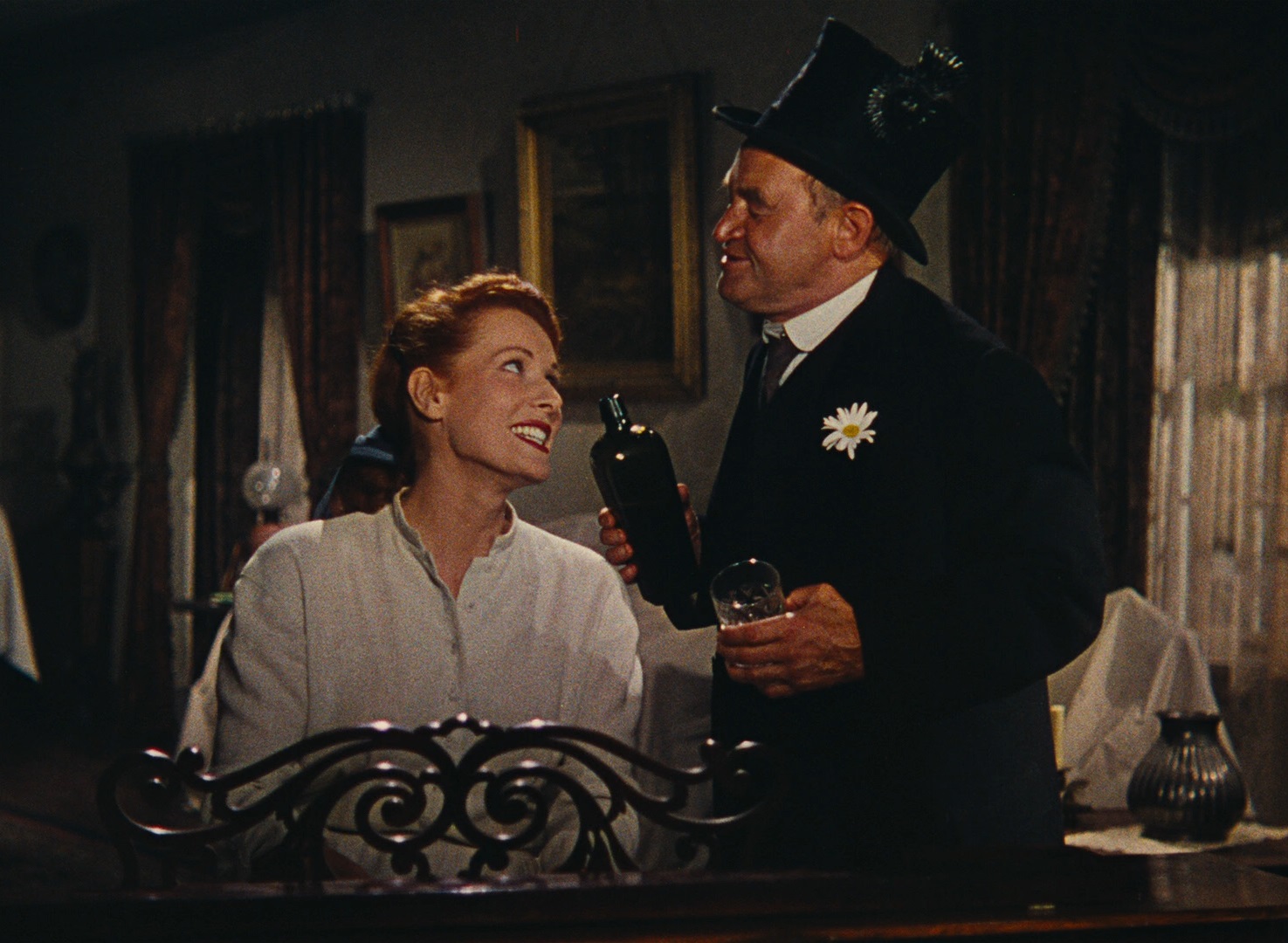| Reviews & Columns |
|
Reviews DVD TV on DVD Blu-ray 4K UHD International DVDs In Theaters Reviews by Studio Video Games Features Collector Series DVDs Easter Egg Database Interviews DVD Talk Radio Feature Articles Columns Anime Talk DVD Savant Horror DVDs The M.O.D. Squad Art House HD Talk Silent DVD
|
DVD Talk Forum |
|
|
| Resources |
|
DVD Price Search Customer Service #'s RCE Info Links |
|
Columns
|
|
|
Quiet Man (Olive Signature), The
Olive Films // Unrated // October 25, 2016
List Price: $39.95 [Buy now and save at Amazon]
In his audio commentary, biographer Joseph McBride describes John Ford as the sum of his contradictions. Perhaps there's something to be said about The Quiet Man in that regard as well. The fervently patriotic Ford made a film in which John Wayne turns his back on America without a second thought. Hearing Ford's name almost certainly brings to mind Westerns and war pictures, and yet so much of The Quiet Man is an explicit rejection of violence. In the era of the Hollywood Blacklist, Ford tells a story in which the pursuit of money is practically toxic. Ford is so often described as a man's man, and a romantic comedy like The Quiet Man is not the most obvious fit for such a mold. Every studio in Hollywood scoffed at the idea of shipping a film crew across the Atlantic for an arthouse project no one would bother to see. "It's a silly little Irish story that won't make a dime," sneered Herbert Yates, whose Republic Pictures nonetheless opened up its checkbook and ended Ford's fifteen year struggle to see his dream realized. Ford had the last laugh. The Quiet Man would soon be nominated for seven Academy Awards, among them the first and only Best Picture nomination in Republic's history. It ranked among the highest grossing films of 1952, and the appeal of The Quiet Man has not just endured but exploded in the many decades since.
Sean Thornton (John Wayne) had long endured the hell of Pittsburgh's sweltering steel mills, but, seeking out the heaven that his mother had spun so many tales about, he's finally returned to the sleepy little speck on the map in Ireland in which he was born. Innisfree is the furthest thing from Heaven, assures the wealthy widow (Mildred Natwick) who owns his ancestral home, but Sean pays her no mind. He's gazed upon the rolling, green hills. He's so captivated by a ravishing redhead (Maureen O'Hara) that Sean is dead certain that he's found himself a wife. No matter how many decades have passed since Sean's family made the trip to America, Innisfree hasn't changed a whit. No phones, no lights, no motorcars, and all that. He's home.
'Course, there wouldn't be much of a movie if it were that easy. Sean is in Innisfree all of twenty minutes before inadvertently making an enemy of "Red" Will Danaher (Victor McLaglen), a hulking brute who's long had his eye on the old Thornton cottage. That bonnie redhead who so wholly entranced him...? Mary Kate is Will's sister, and with a temper as fiery as her crimson red hair, she's no man's doe-eyed love interest. Nevermind that Sean was born in this tiny village and has deep roots going back generations; to the townsfolk here, he is and always will be a Yankee.
The Quiet Man is a bear hug of a movie: an entrancingly gorgeous love letter to the Emerald Isle. Many have certainly been drawn in by its folksy charms and fish-out-of-water comedy. Innisfree isn't merely a backdrop but very much a character in its own right. Even though the film avoids stamping any particular date on its setting -- for all we know, it may not even be a period piece -- that really doesn't matter. Innisfree is the same as it ever was, and that's a chief part of the appeal to Sean and audiences alike. The townsfolk are overflowing with personality, and they do indeed come across as a proper community...as a family that takes care of their own, Yankee or otherwise. There's really only one prickly person in the entire village, and at the end of the day, Will isn't all that bad a guy. The tone, by and large, is light and playful. The stakes aren't life or death, and Sean is determined to keep it that way. This is a story about home, about tradition, about belonging, about respect, about love, about family. These are such timeless themes that it's no wonder that The Quiet Man continues to endure as it has.
There's more to The Quiet Man than its surface charms. A line isn't drawn separating the handful of Protestants from the overwhelmingly Catholic community; regardless of which direction they walk when the church bells ring, they're neighbors and family, and that means they support one another. It's addressed subtly and beautifully. Michaleen (Barry Fitzgerald) may seem at times like a booze-guzzling Oirish stereotype, but he's not only one of the most helpful and supportive characters in the film, he slyly nods to his role in backing the IRA. I appreciate that Mary Kate isn't a shrew to be tamed; in fact, she rightly refuses to give up anything that defines her. She is a strong, feisty woman who seeks a love, understanding, and respect that seemingly no one in Innisfree had been capable of providing. This is not a story of Sean trying to win Mary Kate's heart. Like many of the conflicts throughout The Quiet Man, that's resolved nearly as quickly as it's introduced. Sean coming to grips with the village's tradition of carefully supervised courting is a formality; she is already his and he hers. Though they are soon wed, she doesn't see herself as his wife. Dowries are another longstanding tradition in Innisfree, and though Will is soon duped into consenting to the wedding, on that he won't budge. Mary Kate wants Sean to fight for what's hers...for what's his. It's just that Sean fled America to escape fighting and the pursuit of money, as we learn in one of the film's most powerful and iconic scenes. What he comes to understand is that it's not about pounds or shillings at all. I dunno if Sean's mother ever taught him what a donnybrook is, but by the time The Quiet Man draws to a close, he certainly knows. That villagewide battle royale is a sequence so riotous and unforgettable that the Duke and O'Hara did it all over again in McLintock! a decade later.
There's such a great deal to love about The Quiet Man. Shot largely on location in Ireland, the Technicolor cinematography is still stunning these many decades later, richly deserving its Academy Award and then some. The chemistry between O'Hara and Wayne made for one of cinema's most legendary screen couples, and as many wonderful films as they starred in together, nothing can equal their passionate embrace in the rain here. Though some bristle at the way in which Sean drags Mary Kate, the two of them are otherwise very much on equal footing throughout The Quiet Man. His restraint and quiet torment also make for one of the greatest performances in Wayne's long and storied career. It was a trying and seemingly endless journey for John Ford to get The Quiet Man off the ground; nothing quite like it had been made before, and very little has rivaled it since. It's no wonder that the village in which it was filmed has become such a destination for tourists seeking to capture just a sliver of this idyllic fantasy of the way we wish the world could be. Highly Recommended.
Video
When DVD Talk reviewed Olive Films' initial Blu-ray release of The Quiet Man in 2013, it was awarded five full stars. Though also sourced from that same achingly gorgeous 4K master, this Olive Signature disc boasts a significantly higher bitrate and properly adjusted contrast. The difference is not night and day, but it's unmistakeable just the same, and the end result is absolute perfection.
For those who have yet to experience The Quiet Man in high definition, a single image such as the one below is all the review you'll likely need:
I repeatedly found myself awestruck. Technicolor often has that effect on me, but the juxtaposition of, say, Maureen O'Hara's fiery red mane against a field of lush green is particularly dazzling. Colors aren't fluourescent as they have been in much earlier home video releases -- a retrospective from 1992 elsewhere on this disc is almost uncomfortable to watch because of this -- but their vivacity furthers the sense that Sean has indeed returned to a patch of Heaven on Earth. Heightened yet not removed from reality, it's what you wish the world around you could look like. The image is so richly detailed that I often felt as if I could discern each individual blade of grass and every last fiber in the cast's wardrobe. The exceptionally fine sheen of grain could not be more beautifully reproduced on Blu-ray: so masterfully authored that it holds up to the closest scrutiny. Those frustrated by the artifacting in Olive's initial release will find this to be an essential upgrade. There are no nicks or flecks of dust to speak of anywhere throughout the film's two hour-plus runtime. There's such depth and dimension to The Quiet Man that I often felt, even without any unwieldy 3D glasses, as if I could reach out and touch it. Simply put, one of cinema's most gorgeous films has been lavished with the Blu-ray release it deserves.
Scarcely a byte on this dual-layer Blu-ray disc goes unused, and The Quiet Man's high bitrate AVC encode rightly takes the lion's share. The film's theatrical aspect ratio of 1.37:1 is faithfully preserved here as well.
Audio
Presented in two-channel mono, The Quiet Man's 24-bit DTS-HD Master Audio soundtrack is every bit as extraordinary. Its playful score is rich, full, and warm. Dialogue sounds similarly marvelous, and even with all those Irish brogues, every last line is readily discerned. The lossless audio is, of course, perfectly balanced, with no element in the mix unduly overwhelming another. There isn't so much as the faintest flicker of distortion, nor are there any pops, clicks, intrusive background noise, or much of anything else to grouse or groan about. I'm not left with anything resembling a complaint, unless you feel like reaching enough to point out how shrill a scream during the gloriously chaotic final brawl sounds. This, too, is perfection.
Commentary aside, the only other audio option is a set of English (SDH) subtitles.
Extras
In a perfect world, I'd be reviewing a double feature right now. Last year, Olive Films brought John Ford: Dreaming The Quiet Man to Blu-ray, and that feature-length documentary sports a healthy assortment of extras on its own. I would've loved to have seen all of that find its way here, but no such luck. Olive has produced several new features for this release, though, as well as carrying over extras from their initial BD and Masters of Cinema's recent special edition.
This Olive Signature edition of The Quiet Man arrives in a handsome slipcase, and a booklet with a brief introduction is tucked inside the slim, transparent case.
The Final Word
You can go home again. As Olive Films revisits this perennial favorite, they've ironed out what few flaws were to be found in their initial presentation and assembled a respectable selection of extras to boot. Beyond the film's long-enduring heart and humor, The Quiet Man easily ranks among the most stunning Blu-ray releases of recent memory. Highly Recommended for those who've yet to experience The Quiet Man in high definition; Recommended for those considering an upgrade from Olive Films' 2013 release.
Sean Thornton (John Wayne) had long endured the hell of Pittsburgh's sweltering steel mills, but, seeking out the heaven that his mother had spun so many tales about, he's finally returned to the sleepy little speck on the map in Ireland in which he was born. Innisfree is the furthest thing from Heaven, assures the wealthy widow (Mildred Natwick) who owns his ancestral home, but Sean pays her no mind. He's gazed upon the rolling, green hills. He's so captivated by a ravishing redhead (Maureen O'Hara) that Sean is dead certain that he's found himself a wife. No matter how many decades have passed since Sean's family made the trip to America, Innisfree hasn't changed a whit. No phones, no lights, no motorcars, and all that. He's home.
'Course, there wouldn't be much of a movie if it were that easy. Sean is in Innisfree all of twenty minutes before inadvertently making an enemy of "Red" Will Danaher (Victor McLaglen), a hulking brute who's long had his eye on the old Thornton cottage. That bonnie redhead who so wholly entranced him...? Mary Kate is Will's sister, and with a temper as fiery as her crimson red hair, she's no man's doe-eyed love interest. Nevermind that Sean was born in this tiny village and has deep roots going back generations; to the townsfolk here, he is and always will be a Yankee.
The Quiet Man is a bear hug of a movie: an entrancingly gorgeous love letter to the Emerald Isle. Many have certainly been drawn in by its folksy charms and fish-out-of-water comedy. Innisfree isn't merely a backdrop but very much a character in its own right. Even though the film avoids stamping any particular date on its setting -- for all we know, it may not even be a period piece -- that really doesn't matter. Innisfree is the same as it ever was, and that's a chief part of the appeal to Sean and audiences alike. The townsfolk are overflowing with personality, and they do indeed come across as a proper community...as a family that takes care of their own, Yankee or otherwise. There's really only one prickly person in the entire village, and at the end of the day, Will isn't all that bad a guy. The tone, by and large, is light and playful. The stakes aren't life or death, and Sean is determined to keep it that way. This is a story about home, about tradition, about belonging, about respect, about love, about family. These are such timeless themes that it's no wonder that The Quiet Man continues to endure as it has.
There's more to The Quiet Man than its surface charms. A line isn't drawn separating the handful of Protestants from the overwhelmingly Catholic community; regardless of which direction they walk when the church bells ring, they're neighbors and family, and that means they support one another. It's addressed subtly and beautifully. Michaleen (Barry Fitzgerald) may seem at times like a booze-guzzling Oirish stereotype, but he's not only one of the most helpful and supportive characters in the film, he slyly nods to his role in backing the IRA. I appreciate that Mary Kate isn't a shrew to be tamed; in fact, she rightly refuses to give up anything that defines her. She is a strong, feisty woman who seeks a love, understanding, and respect that seemingly no one in Innisfree had been capable of providing. This is not a story of Sean trying to win Mary Kate's heart. Like many of the conflicts throughout The Quiet Man, that's resolved nearly as quickly as it's introduced. Sean coming to grips with the village's tradition of carefully supervised courting is a formality; she is already his and he hers. Though they are soon wed, she doesn't see herself as his wife. Dowries are another longstanding tradition in Innisfree, and though Will is soon duped into consenting to the wedding, on that he won't budge. Mary Kate wants Sean to fight for what's hers...for what's his. It's just that Sean fled America to escape fighting and the pursuit of money, as we learn in one of the film's most powerful and iconic scenes. What he comes to understand is that it's not about pounds or shillings at all. I dunno if Sean's mother ever taught him what a donnybrook is, but by the time The Quiet Man draws to a close, he certainly knows. That villagewide battle royale is a sequence so riotous and unforgettable that the Duke and O'Hara did it all over again in McLintock! a decade later.
There's such a great deal to love about The Quiet Man. Shot largely on location in Ireland, the Technicolor cinematography is still stunning these many decades later, richly deserving its Academy Award and then some. The chemistry between O'Hara and Wayne made for one of cinema's most legendary screen couples, and as many wonderful films as they starred in together, nothing can equal their passionate embrace in the rain here. Though some bristle at the way in which Sean drags Mary Kate, the two of them are otherwise very much on equal footing throughout The Quiet Man. His restraint and quiet torment also make for one of the greatest performances in Wayne's long and storied career. It was a trying and seemingly endless journey for John Ford to get The Quiet Man off the ground; nothing quite like it had been made before, and very little has rivaled it since. It's no wonder that the village in which it was filmed has become such a destination for tourists seeking to capture just a sliver of this idyllic fantasy of the way we wish the world could be. Highly Recommended.
Video
When DVD Talk reviewed Olive Films' initial Blu-ray release of The Quiet Man in 2013, it was awarded five full stars. Though also sourced from that same achingly gorgeous 4K master, this Olive Signature disc boasts a significantly higher bitrate and properly adjusted contrast. The difference is not night and day, but it's unmistakeable just the same, and the end result is absolute perfection.
For those who have yet to experience The Quiet Man in high definition, a single image such as the one below is all the review you'll likely need:
I repeatedly found myself awestruck. Technicolor often has that effect on me, but the juxtaposition of, say, Maureen O'Hara's fiery red mane against a field of lush green is particularly dazzling. Colors aren't fluourescent as they have been in much earlier home video releases -- a retrospective from 1992 elsewhere on this disc is almost uncomfortable to watch because of this -- but their vivacity furthers the sense that Sean has indeed returned to a patch of Heaven on Earth. Heightened yet not removed from reality, it's what you wish the world around you could look like. The image is so richly detailed that I often felt as if I could discern each individual blade of grass and every last fiber in the cast's wardrobe. The exceptionally fine sheen of grain could not be more beautifully reproduced on Blu-ray: so masterfully authored that it holds up to the closest scrutiny. Those frustrated by the artifacting in Olive's initial release will find this to be an essential upgrade. There are no nicks or flecks of dust to speak of anywhere throughout the film's two hour-plus runtime. There's such depth and dimension to The Quiet Man that I often felt, even without any unwieldy 3D glasses, as if I could reach out and touch it. Simply put, one of cinema's most gorgeous films has been lavished with the Blu-ray release it deserves.
Scarcely a byte on this dual-layer Blu-ray disc goes unused, and The Quiet Man's high bitrate AVC encode rightly takes the lion's share. The film's theatrical aspect ratio of 1.37:1 is faithfully preserved here as well.
Audio
Presented in two-channel mono, The Quiet Man's 24-bit DTS-HD Master Audio soundtrack is every bit as extraordinary. Its playful score is rich, full, and warm. Dialogue sounds similarly marvelous, and even with all those Irish brogues, every last line is readily discerned. The lossless audio is, of course, perfectly balanced, with no element in the mix unduly overwhelming another. There isn't so much as the faintest flicker of distortion, nor are there any pops, clicks, intrusive background noise, or much of anything else to grouse or groan about. I'm not left with anything resembling a complaint, unless you feel like reaching enough to point out how shrill a scream during the gloriously chaotic final brawl sounds. This, too, is perfection.
Commentary aside, the only other audio option is a set of English (SDH) subtitles.
Extras
In a perfect world, I'd be reviewing a double feature right now. Last year, Olive Films brought John Ford: Dreaming The Quiet Man to Blu-ray, and that feature-length documentary sports a healthy assortment of extras on its own. I would've loved to have seen all of that find its way here, but no such luck. Olive has produced several new features for this release, though, as well as carrying over extras from their initial BD and Masters of Cinema's recent special edition.
- Audio Commentary: John Ford biographer Joseph McBride strikes a brilliant balance in his commentary. It's scholarly but delivered with such personality, never sounding as if he's simply reading from meticulously prepared notes. The end result is endlessly engaging, entertaining, and enlightening. McBride does a terrific job exploring The Quiet Man in the context of Ford's body of work as a whole, including the Irish elements that recur throughout his filmography and his decade and a half struggle to bring his adaptation to the screen. He speaks about how both The Quiet Man and Ford himself have been viewed in Ireland. McBride approaches The Quiet Man not just as a historian but with a critical eye as well, delving into the distancing effect of deliberately mismatched eyelines, how cutting between studio shots and location photography furthers the sense that we're seeng Ireland through Sean's idealizing eyes, and how Ford prefers to buck convention by starting in close-ups before going wide. McBride also delves into the intentionally vague time period in which The Quiet Man is set, concerns raised about the original story's political elements, a clever way of discouraging a mandated two hour ceiling for its runtime, and the origin of Mary Kate's name. It's such a wonderfully thorough discussion that McBride even translates Mary Kate's Gaelic confession! This is an outstanding commentary and easily the most exceptional of the disc's extras.
- A Tribute to Maureen O'Hara (9 min.; HD): Also exclusive to this Olive Signature release is a collection of interviews with Hayley Mills, Juliet Mills, and Ally Sheedy, all of whom were fortunate enough at one point or another to have shared the screen with Maureen O'Hara. The three of them speak about O'Hara's presence, strength, thoughtfulness, and glamour. It's peppered with wonderful anecdotes, such as instructing one of her young co-stars how to save on laundry costs when staying in a hotel.
- Don't You Remember It, Seánin? (17 min.; HD): This visual essay by John Ford historian Tag Gallagher is carried over from the Masters of Cinema release in the UK. I'm more accustomed to visual essays that play like a scholarly discussion reinforced by film excerpts. Gallagher instead speaks as if he's softly reciting poetry, with the choppy stop-and-go rhythm of showing off a holiday slideshow. A great deal of insight is offered here, including slowing the framerate to better illustrate Maureen O'Hara's rapidly changing emotions and a study of the use of flowers throughout John Ford's filmography, yet it's so daringly artful that I wasn't entirely sure what I was watching for a short while there. Not for me, I must confess.
- Free Republic: The Story of Herbert J. Yates and Republic Pictures (5 min.; HD): Though its full title suggests something more in-depth, "Free Republic" does chart Yates building upon his processing business and moving into feature film production, including striking deals with the likes of John Wayne and John Ford. The featurette's central focus is on the critical role Republic played in realizing Ford's longstanding dream of making The Quiet Man, including a budget that'd fund an entire year's worth of Westerns. It paints Yates as a more supportive figure than virtually everything else I've read. as well as Yates' instincts to resist interfering all that much. The rich payoff to the studio's gamble is celebrated as well.
- The Old Man: Peter Bogdanovich Remembers John Ford (12 min.; HD): The man behind Directed by John Ford remains, as ever, an arresting storyteller, weaving together tales of John Ford tormenting him on-set, how discussion of filmmaking was banned during dinner (complete with a fine!), as well as how Ford felt about being the subject of a documentary. A good bit of the discussion does focus specifically on The Quiet Man, which Bogdanovich points to as Ford's most personal film, and he also touches on John Wayne quipping that he had nothing to do for the first nine reels.
- The Making of The Quiet Man (28 min.; SD): Written and hosted by Leonard Maltin, this half-hour retrospective from 1992 has been a fixture on home video releases of The Quiet Man, and rightly so. There's an impressive amount of supplementary imagery, including glimpses of a shooting script, censor letters, production schedules, and Irish press. We're treated to the sight of a shillelagh from the film and hear dialogue that went unused. Michael Wayne, Toni Wayne La Cava, and Andrew V. McLaglen -- all of whom have since passed away -- are interviewed. Among the many topics of conversation are Maureen O'Hara being dragged through sheep dung, how there wouldn't be The Quiet Man without Rio Grande before it, and the village of Cong getting electricity for the first time while production was underway. The execution is dated, but the material more than makes up for that.
This Olive Signature edition of The Quiet Man arrives in a handsome slipcase, and a booklet with a brief introduction is tucked inside the slim, transparent case.
The Final Word
You can go home again. As Olive Films revisits this perennial favorite, they've ironed out what few flaws were to be found in their initial presentation and assembled a respectable selection of extras to boot. Beyond the film's long-enduring heart and humor, The Quiet Man easily ranks among the most stunning Blu-ray releases of recent memory. Highly Recommended for those who've yet to experience The Quiet Man in high definition; Recommended for those considering an upgrade from Olive Films' 2013 release.
|
| Popular Reviews |
| Sponsored Links |
|
|
| Sponsored Links |
|
|
| Release List | Reviews | Shop | Newsletter | Forum | DVD Giveaways | Blu-Ray | Advertise |
|
Copyright 2024 DVDTalk.com All Rights Reserved. Legal Info, Privacy Policy, Terms of Use,
Manage Preferences,
Your Privacy Choices | |||||||









